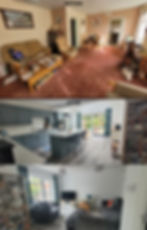The Cost of Building a Home Extension in 2025
- MWArchitectural
- Jan 9, 2025
- 4 min read
Adding an extension is one of the most popular ways to increase living space and add value to your home. However, understanding the construction costs involved is crucial for homeowners considering this investment. In this blog post, we’ll break down the key factors influencing the cost of a home extension in 2025 and provide practical tips to help you budget effectively. Whether you’re planning a small kitchen extension or a large double-storey addition, this guide is for you.

Key Factors Affecting the Cost of a Home Extension in 2025
Size and Complexity. The size of your extension is one of the biggest cost drivers. Single-storey extensions (such as a typical rear kitchen/ living/ dining lean-to type extension) typically cost more per square metre than double-storey builds once you account for the fact that you are doubling up your internal area. Overall, however, a double storey extension will come in more expensive than a single so it’s a decision for efficiency as well as overall budget. In 2025, the average cost per square metre ranges from around £1,800 to £3,500, depending on if the project is double or single storey, the exact scope of work and your choice of materials.
Construction Methodology. The cost of materials continue to fluctuate in 2025 due to supply chain disruptions and increased demand. We often get the question as to whether a ‘traditional’ brick and blockwork construction methodology is more or less expensive than alternatives (timber frame, metal frame, SIPs panels etc) and the truth is that this changes all the time and varies with region and supplier. Additionally, it’s crucial to consider the other aspects that come with different construction methodologies (time, sustainability, local skills or reputable providers, site access etc).
Interior Materials. Finishes, fixtures and fittings is generally seen as the fun stuff and you often have a much wider range of choices available when compared with the materials used for the construction methodology. However, opting for high-end suppliers or materials can significantly increase costs which, for some, might be a must-have. It’s important to bear this in mind at an early stage and ear-mark a sensible amount if you want to avoid compromising on this later.
Labour Costs. Skilled labour rates have risen in 2025, particularly in urban areas and in the South-East. While this is less prevalent in the West Midlands where we typically operate, labour costs will account for around 30-40% of your total project budget. Working with a reputable contractor or architectural firm ensures you receive quality work and fewer delays – the two areas where conflicts arise and labour costs spiral.
Planning and Regulatory Requirements. Navigating planning permissions and building regulations can add to your expenses, especially if there might be multiple consultants needed to support an application (i.e. arboriculturist, planning consultant, heritage specialist, ecologist etc). Design and consultancy can account for between 10-20% of your budget. Engaging an architectural designer experienced in UK planning law can advise you on this need as well as streamline the planning process to avoid costly delays.
Additional Electrical or Mechanical Items. Features such as air source heat pumps, underfloor heating, smart home systems, battery systems or solar panels can enhance functionality and aesthetics but will also increase your budget. It’s important to take advice on all of these potential upgrades as some may come with further implications on costs and design – a common occurrence we’re finding is the accommodation of a water tank or the changing of your radiators for those homes upgrading to an air source heat pump from a gas combi boiler.
How to Budget for Your Home Extension
Set a Realistic Budget: Begin with a clear understanding of what you can afford and factor in a 10-15% contingency fund for unexpected expenses. Have early discussions with builders or designers if you need some guidance.
Work with Professionals: Hiring an experienced designer and builder can save money in the long run by avoiding design flaws and ensuring efficient construction. Ask for their education or training details, experience of similar projects, whether they have insurance and are members of any bodies that uphold professional standards. Obviously, client testimonials are also incredibly beneficial.
Plan Ahead: Early planning can help secure fixed quotes for materials and labour, protecting you from price hikes. Engaging early with suppliers helps limit the chances of costly errors as well as stressful situations!
Consider Energy Efficiency: Incorporating energy-efficient designs and renewable energy solutions can lower running costs and increase the long-term value of your home.

Average Costs of Home Extensions in 2025
Single-storey rear extension: £45,000 - £90,000 with an average of £70,000
Double-storey extension: £60,000 - £110,000 with an average of £95,000
Loft conversion: £45,000 - £75,000 (for comparison) with an average of £60,000
Maximising the Return on Your Home Extension
To ensure your extension adds maximum value to your property, focus on carefully considered aesthetic design details, functional and flexible layouts, along with build quality. A well-designed extension can add up to 15-25% to your home’s market value, particularly in high-demand areas. Collaborating with a talented designer ensures the design aligns with your own stylistic values while meeting your lifestyle needs.
Contact Us for Your Home Extension Project
A fresh but established architectural practice, we specialise in designing bespoke home extensions tailored to your needs and budget. Whether you’re looking for inspiration or ready to start your project, we’re here to help. Contact us today to schedule a consultation and bring your dream space to life.
